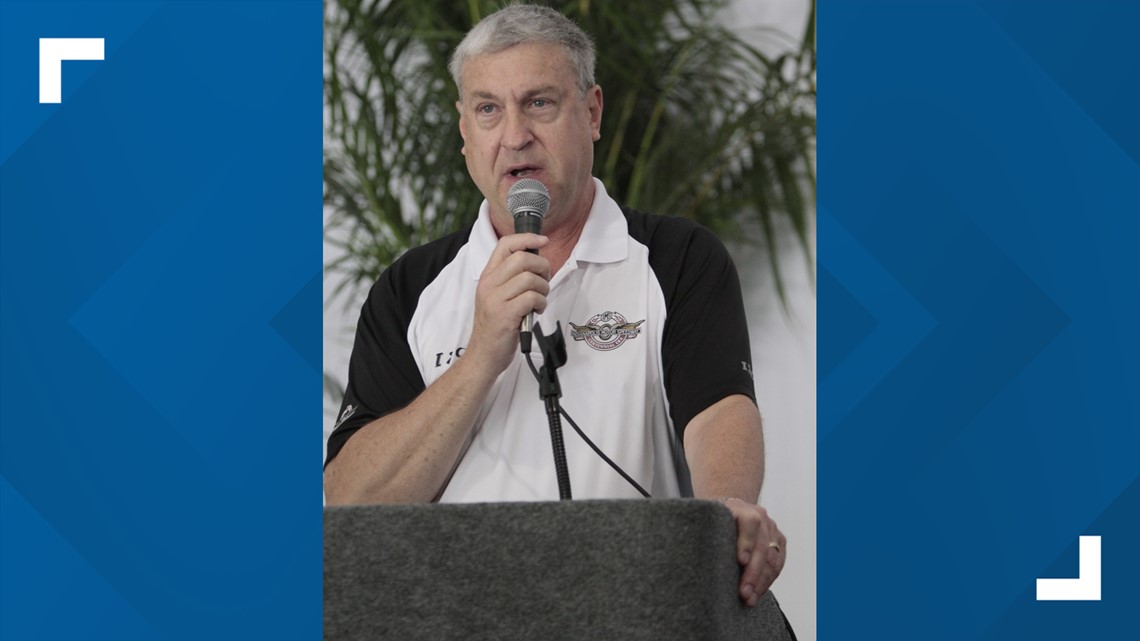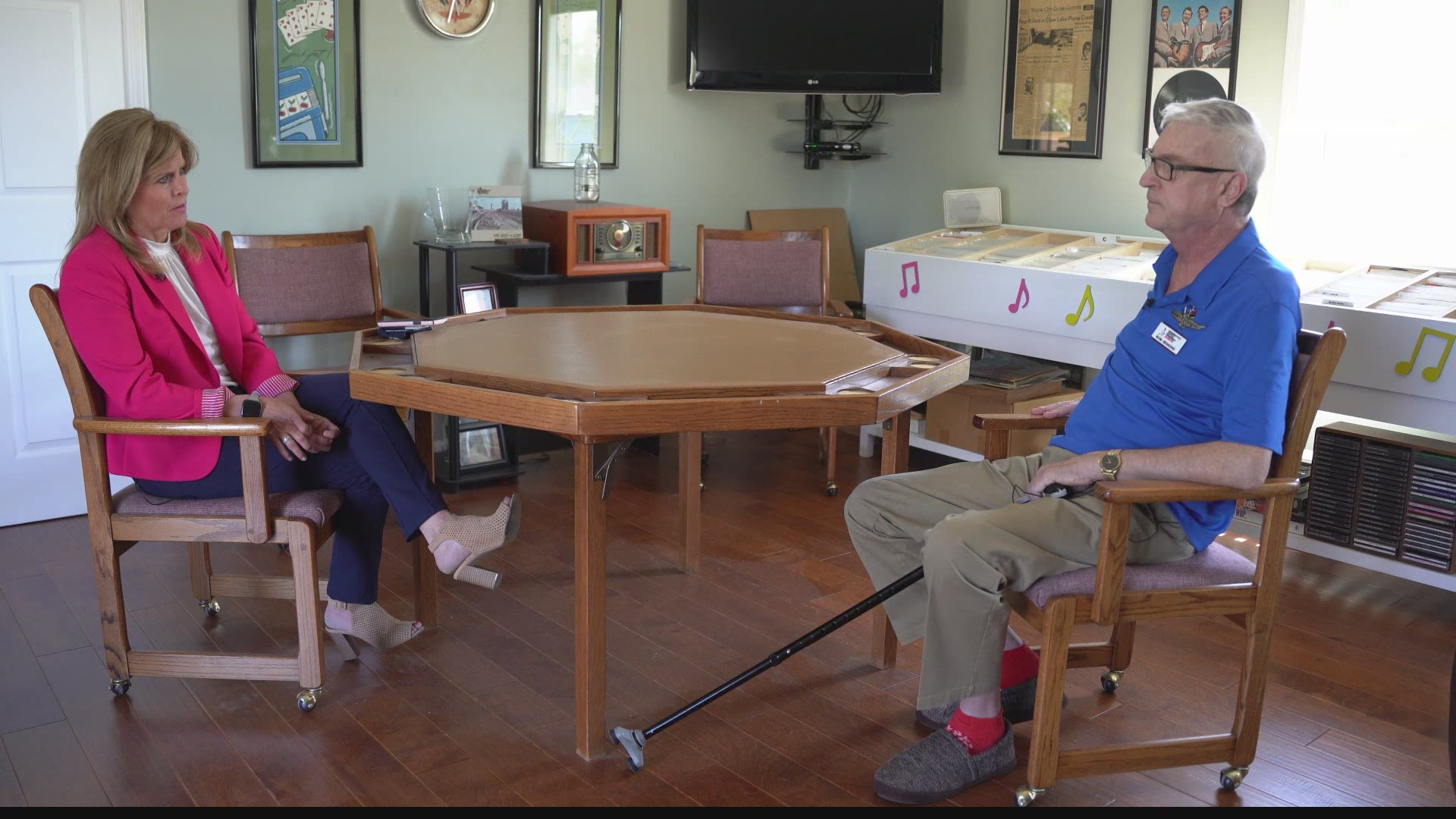SPEEDWAY, Ind. — Longtime racing and track announcer Bob Jenkins is stepping back from work duties Sunday and plans to experience the Indianapolis 500 just like the rest of us: as a racing fan.
Jenkins made the decision after doctors told him he has brain cancer. The 73-year-old lives in Crawfordsville.
This year, he has had brain surgery, radiation and chemotherapy. He beat colon cancer in 1979 and is hoping for the same outcome now, but he knows the odds are not good. He believes in the power of prayer and covets those from fans now.
In the meantime, sitting in his man cave filled with racing memorabilia, Jenkins is filled with gratitude.
"I've had the greatest career that anyone could ever have ever had," Jenkins said.
A race fan since the 1950s who's worked in some capacity for ABC/ESPN or the Speedway as an announcer since the late '70s, Jenkins considers the 500-mile race magical.
"The most important time on race day is the ceremony just before the start," Jenkins said. "The playing of Taps, 'Back Home Again in Indiana' and 'Gentlemen, start your engines,' all of those 20 minutes are so important to me," Jenkins said.
While fans today may not recognize Jenkins in person, he said it's a different story when he starts talking.
"All I have to do is open my mouth — Aha, that's a familiar voice!" Jenkins said.
Unique, distinctive and like the roar of race cars, Jenkins on the mic is a signature sound of Indy in May. Jenkins said his voice is just a gift from God.
"I'm just a race fan that got lucky!" Jenkins said. "It all came together. It all fell right in place. How? I don't know, but it did."


He said his lucky streak broke in December 2020.
"On Christmas night about 3:15 a.m., I woke up with a very, very bad headache and I knew it was more than just a headache," Jenkins said. "The first diagnosis was a stroke, the second diagnosis was two malignant tumors in the right frontal lobe."
"When they did my first MRI. My tumors had grown three times their size, just in the first month." Jenkins said.
Right now, Jenkins is taking chemotherapy pills and says future imaging will reveal if the tumors are considered stable.
"The surgeon said that she got most of both of them, so that is encouraging to me," Jenkins said.
Jenkins publicly broke the news of his illness in February through a conversation on YouTube with Indianapolis Motor Speedway President Doug Boles.
During the conversation, Boles thanked Jenkins for his decades of work at the track and offered him a goal to get well.
"That seat in the PA booth is there for you any day you want to come in," Boles said.
Boles also invited fans to send get well cards to the Speedway and in days, mail arrived from all over the world.
Jenkins has kept all the notes, and said it surprised him how much well wishes from strangers brightened his day.
"They are important to me. Thank you, fans. I love you. I really do," Jenkins said.
The racing community also posted support online. On Twitter, IndyCar driver Simon Pagenaud described Jenkins voice as a hug for race fans.
"That brought tears to my eyes," Jenkins said. "Really, there was nothing that could be said that meant more to me than that."
Jenkins is intimately familiar with what's ahead. His wife Pam died in 2012, six months after a primary cancer elsewhere spread to her brain.
"It was very hard for me. It was very hard for her. It was very hard for everybody," Jenkins said.
His symptoms now, which include difficulty remembering names and details, mirror the challenges his wife faced.
"I still am very, very confused at times. It's a tough time, it really is," Jenkins said.
Jenkins said he doesn't want to hear a prognosis from his doctor but he doesn't fear death.
"I don't want to die, but I think I'm ready," Jenkins said.
Jenkins grew up outside of Richmond in Liberty, Indiana. He and Pam never had children, but he considers the racing community his family. And while some details of his notable career are now fuzzy, he remembers with great detail the highlight of his career: the call at the end of the 1992 race — the closest finish in Indianapolis 500 history.
"Without a question, that's most memorable moment," Jenkins said.
Race winner Al Unser Jr. held off Scott Goodyear for the victory by 0.043 seconds.
"It's something that I will never ever forget, and nothing comes close," Jenkins said.
This year, there are no bios to memorize, no homework required before the green flag. Jenkins plans to watch the race, just like he did back in the '50s, enjoying the atmosphere and traditions and praying he'll be back next year.
"I don't like to dwell on the fact that this may be the last, but yes, I'm very, very well aware of it," Jenkins said. "I just want to watch the race and have fun and hope it's a safe race. I have a lot to be thankful for, I've been blessed. I really have."

